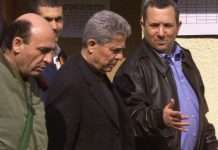هيومن رايتس ووتش: لبنان: نمط من الملاحقات بسبب حرية التعبير ويجب إلغاء قوانين تجريم التعبير السلمي وإسقاط التهم
بيروت/31 كانون الثاني/قالت “هيومن رايتس ووتش” اليوم إن نمط الملاحقات القضائية بحق منتقدي المسؤولين يهدد حرية التعبير والرأي في لبنان. الأسبوع الماضي، في 24 يناير/كانون الثاني 2018، في آخر قضية من نوعها، وجهت النيابة العامة تهمة التشهير إلى هشام حداد، مقدم برنامج كوميدي، بعد حلقة أطلق فيها نكات عن رئيس الوزراء سعد الحريري وولي العهد السعودي الأمير محمد بن سلمان.
على السلطات إسقاط التهم الجنائية ضد الخطاب السلمي، وعلى البرلمان أن يلغي فورا القوانين التي تجرّم مجرد انتقاد السلطات أو الرموز الوطنية. لا يجوز للسلطات في أي حال من الأحوال احتجاز الأشخاص بسبب الانتقادات السلمية.
قالت لما فقيه، نائبة مديرة قسم الشرق الأوسط في هيومن رايتس ووتش: “مساحة حرية التعبير في لبنان تتقلص بسرعة، إذ تواصل السلطات توجيه اتهامات جنائية ردا على انتقادات ضد المسؤولين. هذا النوع من الرد الثقيل لا يؤدي سوى إلى تقييد حرية التعبير والرأي، وتشويه صورة لبنان”.
ازدادت حدة هذه الحالات في الأشهر الأخيرة. في 10 يناير/كانون الثاني، حكمت محكمة لبنانية عسكرية على الصحفية والباحثة اللبنانية حنين غدار غيابيا بالسجن 6 أشهر، بتهمة التشهير بالجيش اللبناني خلال مؤتمر عام 2014 في الولايات المتحدة، وفقا لما ذكرته غدار لـ هيومن رايتس ووتش. في 20 يناير/كانون الثاني، استدعت مخابرات الجيش الناشط عبادة يوسف، لاستجوابه بشأن منشورات في “فيسبوك” عن كبار السياسيين اللبنانيين. قال يوسف لهيومن رايتس ووتش إنه احتجز من قبل الجيش وقوى الأمن 4 أيام.
في نوفمبر/تشرين الثاني 2017، أفادت وسائل إعلام محلية أن مارسيل غانم، مقدم البرامج التلفزيونية البارز، اتُهم بعرقلة سير العدالة بعد أن احتج على التهم الموجهة ضد اثنين من ضيوفه لانتقاد الرئيس. في نوفمبر/تشرين الثاني أيضا، اعتُقل الشاعر اللبناني مصطفى سبيتي، بتهمة “الإساءة” إلى مريم العذراء على فيسبوك، واحتجز 16 يوما. قال محاميه لهيومن رايتس ووتش إنه اتُهم بموجب المادتين 474 و317 من قانون العقوبات اللبناني، فيما يتعلق بإهانة الشعائر الدينية والتحريض على الطائفية. في الشهر نفسه، اعتُقل الصحفي وأمين عام “التحالف المدني الإسلامي” أحمد أيوبي بتهمة تحقير الرئيس، واحتجز 13 يوما، وفقا لما قاله محاميه لهيومن رايتس ووتش.
بالإضافة إلى الملاحقات القضائية المتعلقة بالتعبير الذي لا ينبغي تجريمه، استخدمت الأجهزة الأمنية، بما فيها قوى الأمن الداخلي والجيش اللبناني، القوة ردا على احتجاجات أخيرة، ما زاد من تآكل مساحة حرية التعبير. أدى ما يبدو أنه انعدام المساءلة عن هذه الانتهاكات إلى تأزيم الوضع.
رغم أن المحاكم اللبنانية لا تصدر في كثير من الأحيان أحكاما بالسجن لمدة طويلة على الخطاب السلمي، إلا أن الملاحقات القضائية واستخدام الحبس الاحتياطي والمحاكمات المطولة تشد الخناق على حرية التعبير والرأي.
يضمن الدستور اللبناني حرية التعبير “ضمن دائرة القانون”. ولكن قانون العقوبات اللبناني يجرم القدح والذم ضد الموظفين العموميين، ويجيز السجن حتى سنة في مثل هذه الحالات. تسمح المادة 384 من قانون العقوبات بالسجن بين 6 أشهر وسنتين لـ “تحقير” الرئيس أو العلم أو الشعار الوطني. تجرم المادة 157 من “قانون القضاء العسكري” إهانة العلم أو الجيش، وتنص على السجن بين 3 أشهر و3 سنوات.
القوانين التي تسمح بالسجن ردا على انتقاد الأفراد أو المسؤولين الحكوميين لا تتفق مع التزامات لبنان الدولية بحماية حرية التعبير. هذه القوانين هي استجابة غير متناسبة وغير ضرورية لضرورة حماية السمعة، وتشلّ التعبير الحر. بالإضافة إلى ذلك، لا يعرّف القانون اللبناني جيدا مصطلحات “القدح” و”الذم” و”التحقير”، ويمكن استخدام أحكام القانون الغامضة وواسعة النطاق لقمع انتقاد أعمال أو سياسات المسؤولين الحكوميين.
رأت “لجنة حقوق الإنسان التابعة للأمم المتحدة”، التي تفسر “العهد الدولي الخاص بالحقوق المدنية والسياسية” الذي صادق عليه لبنان عام 1972، أن “مضايقة شخص بسبب الآراء التي يعتنقها أو تخويفه أو وصمه، بما في ذلك توقيفه أو احتجازه أو محاكمته أو سجنه”، تنتهك العهد. أعلنت اللجنة معارضتها للقوانين التي تجرم إهانة رئيس الدولة أو الرموز الوطنية. كما أوضحت أن “في حالات النقاش العام الذي يتعلق بشخصيات عامة في المجال السياسي والمؤسسات العامة، فإن العهد يولي أهمية بالغة بشكل استثنائي لكفالة التعبير غير المقيد”.
وثّقت منظمات حقوقية محلية ودولية منذ فترة طويلة استخدام لبنان قوانين التشهير لمعاقبة المحامين والصحفيين والناشطين على الآراء والبيانات التي يحميها القانون الدولي لحقوق الإنسان. وجد “مركز الدفاع عن الحريات الاعلامية والثقافية-سكايز”، في تقرير صدر عام 2016، أن قوانين التشهير اللبنانية تُستخدم “لاستهداف الناشطين والمعارضين … وتخويف الصحفيين عبر الإنترنت والمدونين ومستخدمي الإنترنت من التحدث عن مواضيع معينة، ما يمهد الطريق أمام الرقابة الذاتية وخنق التعبير”.
في أكتوبر/تشرين الأول 2015، أنشأت منظمة “مارش” غير الحكومية اللبنانية، التي تعمل على حرية التعبير، خطا ساخنا، وهو ما يعد بتقديم استشارات قانونية لأي شخص يستدعيه “مكتب جرائم المعلوماتية” في لبنان بسبب التعبير على الإنترنت.
قالت هيومن رايتس ووتش إن انتشار مثل هذه الملاحقات القضائية والتهديد بالاعتقال يعكسان الحاجة الملحة إلى أن يزيل البرلمان اللبناني العقوبات الجنائية عن القدح، الذم، وانتقاد المسؤولين والرموز العامة.
قالت فقيه: “العدد المرتفع وحده لهذه التوقيفات والملاحقات يثير القلق؛ كما أن هذا التعبير لم يكن ينبغي أن يُجرَّم في الأصل. على البرلمان اللبناني إلغاء القوانين التي تجرم حرية التعبير والتشهير، ووقف هذه الملاحقات القضائية”.
HRW/Lebanon: Pattern of Prosecutions for Free Speech
Repeal Laws Criminalizing Peaceful Speech; Drop Charges
Human Rights Watch/ January 31/18/(Beirut) – A pattern of prosecutions for criticizing officials is threatening freedom of speech and opinion in Lebanon, Human Rights Watch said today. Last week, On January 24, 2018, in the latest such case, the public prosecutor brought defamation charges against a comedy show host, Hisham Haddad, after an episode in which he made jokes relating to Prime Minister Saad Hariri and Saudi Crown Prince Mohammad Bin Salman.
Authorities should drop criminal charges for peaceful speech and parliament should urgently repeal laws that criminalize mere criticism of authorities or national symbols. In no case should authorities detain people for peaceful criticism.
“The space for free expression in Lebanon is rapidly shrinking, as authorities continue to bring criminal charges in response to criticism of public officials,” said Lama Fakih, deputy Middle East director at Human Rights Watch. “This type of heavy-handed response does nothing but restrict free expression and opinion, and tarnish Lebanon’s image.”
The pattern of such cases has intensified in recent months. On January 10, Lebanon’s military court sentenced a Lebanese journalist and researcher, Hanin Ghaddar, in absentia to six months in prison for defaming the Lebanese army during a 2014 conference in the United States, Ghaddar told Human Rights Watch. On January 20, Lebanon’s military intelligence summoned an activist, Obada Yousef, for questioning over Facebook posts concerning leading Lebanese politicians. He was detained by the military and police for four days, he told Human Rights Watch.
In November 2017, local media reported that a prominent television host, Marcel Ghanem, was charged with obstruction of justice after he protested charges brought against two of his guests for criticizing the president. Also in November, a Lebanese poet, Mustafa Sbeity, was arrested for “insulting” the Virgin Mary in a Facebook post and detained for 16 days. His lawyer told Human Rights Watch that he was charged under articles 474 and 317 of Lebanon’s criminal code, pertaining to insulting a religion and inciting sectarianism. That same month, the journalist and secretary general of the Civil Islamic Coalition, Ahmad Ayoubi, was arrested for defaming the president, and detained for 13 days, his lawyer told Human Rights Watch.
In addition to prosecutions for speech that should not be criminalized, security services including Lebanon’s Internal Security Forces and army have used force in response to recent protests, further eroding the space for freedom of expression. The apparent lack of accountability for these abuses has only compounded the situation.
Although Lebanon’s courts do not frequently issue lengthy prison sentences for peaceful speech, the prosecutions, use of pretrial detention, and lengthy trials further stifle free expression and opinion.
Lebanon’s constitution guarantees freedom of expression “within the limits established by law.” But the Lebanese penal code criminalizes libel and defamation against public officials and authorizes imprisonment of up to one year in such cases. Article 384 of the penal code authorizes imprisonment of six months to two years for insulting the president, the flag, or the national emblem. Article 157 of the military code of justice criminalizes insulting the flag or army, punishable by three months to three years in prison.
Laws that allow imprisonment in response to criticism of individuals or government officials are incompatible with Lebanon’s international obligations to protect freedom of expression. Such laws are a disproportionate and unnecessary response to the need to protect reputations, and they chill freedom of expression. In addition, “libel,” “defamation,” and “insult” are not well-defined in Lebanese law, and such vague and broadly worded provisions can be used to quell criticism of the actions or policies of government officials.
The United Nations Human Rights Committee, which interprets the International Covenant on Civil and Political Rights, has held that “harassment, intimidation or stigmatization of a person, including arrest, detention, trial or imprisonment for reasons of the opinions they may hold, constitutes a violation” of the covenant, which Lebanon ratified in 1972. The committee has stated its disapproval of laws that criminalize insulting the head of state or national symbols. It has made clear that “in circumstances of public debate concerning public figures in the political domain and public institutions, the value placed by the covenant upon uninhibited expression is particularly high.”
Local and international human rights organizations have long documented Lebanon’s use of defamation laws to penalize lawyers, journalists, and activists for opinions and statements that are protected under international human rights law. The Skeyes Center for Media and Cultural Freedom found in a 2016 report that Lebanese defamation laws were being used for “targeting activists and dissidents and … intimidating online journalists, bloggers and Internet users from speaking about certain subjects, thus paving the way for self-censorship and the chilling of speech.”
In October 2015, MARCH, a Lebanese nongovernmental organization working on freedom of expression, created a hotline, promising legal support to anyone summoned by Lebanon’s cybercrimes bureau for online expression.
The proliferation of such prosecutions and the threat of arrest reflect an urgent need for Lebanon’s parliament to remove criminal sanctions for libel, defamation, and criticism of public officials and symbols, Human Rights Watch said.
“The sheer number of these arrests and prosecutions for speech that should never have been criminalized is alarming,” Fakih said. “Lebanon’s parliament should repeal laws criminalizing free speech and defamation and put an end to these prosecutions.”






















